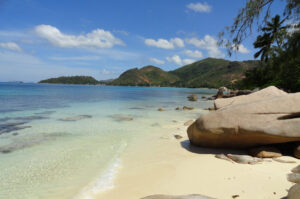
Conservation International, based in Washington, DC, and Friends of Nature, from Belize, joined forces to establish the reserve. Conservation International came up with most of the $300,000 purchase price, while the Belize group has hired rangers and will manage the reserve. The area near the island is the only known gathering spot for whale sharks.
Plans call for a research facility on the island and a ranger station to manage fishing and tourism in the area. Scientists expect to learn more about the breeding and migratory habits of the fish, which is listed as a threatened species.
The whale shark, which despite its name is not related to whales, is known to reach a length of 46 feet and weigh up to 15 tons. And it has a mouth to match its size. Using a four-foot-wide opening, this filter feeder sucks in huge amounts of water as it swims and then filters the nourishing plankton, krill, fish, fish eggs, and squid.
Local fishers who have traditionally caught snapper in the area have agreed to cooperate with the project. Rather than fish in the protected areas, they will bring boatloads of tourists and divers to see the whale sharks, which are harmless to people. The rangers will establish appropriate limits to prevent harassment of the giant fish.
 Associated Press
Associated Press

